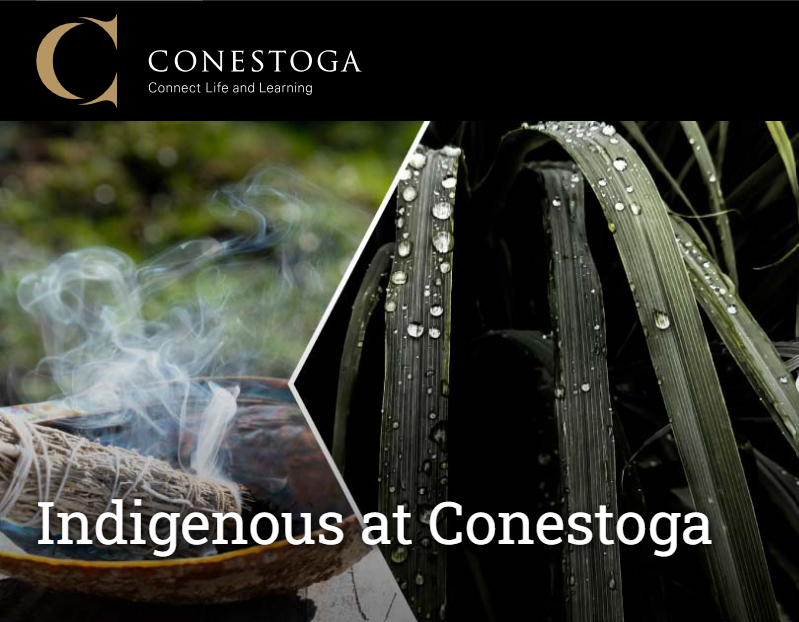The Office of Indigenous Initiatives at Conestoga, in partnership with Mississaugas of the Credit and the School of Creative Industries, was awarded a $1-million grant from the federal government for an Indigenous-led applied research project to revitalize the endangered Indigenous language of Anishinaabemowin.

The Office of Indigenous Initiatives at Conestoga, in partnership with Mississaugas of the Credit and the School of Creative Industries, was awarded a $1-million grant from the federal government for an Indigenous-led applied research project.
Gi-inwewin Gi-naazikaanag / The Returning to our Languages Project was chosen for one of six grants - with Conestoga being the only college receiving funding. This is the largest Indigenous research grant awarded to Conestoga.
Danielle Boissoneau, director of Indigenous Initiatives and project co-director, emphasized the importance of this work.
“By examining the historical injustices, we can see the detrimental impacts of colonization upon Indigenous health and well-being. Restoring access to Anishinaabemowin remains one of our biggest hurdles because our speakers are getting older. This project seeks to prioritize Indigenous health and well-being by placing Conestoga College in the role of treaty partner and learning about how we can use our resources to support neighbouring Indigenous communities.”
The funding comes from a joint initiative between the National Centre for Truth and Reconciliation and the Social Sciences and Humanities Research Council to establish a national research program to advance the collective understanding of reconciliation as explained in the Truth and Reconciliation Commission of Canada Call to Action 65.
The council committed to investing up to $6 million, with each grant valued at a maximum of $1 million over five years. Teams led by First Nations, Métis Nation or Inuit researchers were invited to submit proposals for new or existing formal partnerships.
Gi-inwewin Gi-naazikaanag / The Returning to our Languages Project will work towards language revitalization through succession planning for fluent speakers of Anishinaabemowin to teach and connect with language learning apprentices. In community, language nests will take place, which are focused on language acquisition and retention using immersion-style learning opportunities. This is important, particularly for novice-level learners, to increase fluency and succession rates for the continued revitalization of Anishinaabemowin.
Conestoga will also work in partnership with Mississaugas of the Credit First Nation to provide the logistical and administrative support to deliver programming, while also offering Truth and Reconciliation training for college employees.
This project will also seek to design, develop and deliver a one-year Anishinaabemowin teaching and learning certificate in partnership with the School of Creative Industries. “We at the School of Creative Industries are thrilled to embark on this transformative research project in partnership with the Office of Indigenous Initiatives and the Mississaugas of the Credit First Nation,” said Pejman Salehi, executive dean of the School of Creative Industries.
Faculty and students will contribute their skills and creativity to develop interactive content that will enrich the Anishinaabemowin teaching and learning certificate. They are excited to explore the incorporation of emerging technologies, such as augmented reality/virtual reality, into Anishinaabemowin language learning - pushing the boundaries of traditional education.
“This project not only allows us to support the preservation and celebration of the Anishinaabemowin language and culture, but also provides a unique opportunity for our students to engage in applied research.”
The Indigenous language of Anishinaabemowin is considered an endangered language because it is no longer the primary language spoken by Anishinaabek children. Only 0.7 per cent of the total population is fluent in Anishinaabemowin.
Michelle Chrétien, vice-president of Research & Innovation, said the grant represents a significant step forward in the college’s commitment to advancing meaningful reconciliation efforts and supporting initiatives that honour Indigenous histories, cultures and languages.
“This grant is crucial for advancing educational opportunities and collaborations that reflect the college’s commitment to reconciliation and the inclusion of Indigenous perspectives in their programs and research,” Chrétien said.
“By integrating Indigenous ways of knowing and being into our programs, we are not only enriching the educational experiences of our students, but also contributing to a more inclusive and equitable environment.”
Conestoga is committed to increasing Indigenous learners’ access to and success in post-secondary education and closing the participation and achievement gap. The college's response to the Truth and Reconciliation Commission of Canada's Calls to Action continues through ongoing emphasis on improving education and attainment levels and success rates of Indigenous learners.
Developing culturally appropriate curricula, including the teaching of Indigenous languages, as well as offering a range of programming, services and research opportunities that promote Indigenous ways of knowing and reconciliation remain a priority.
To learn more and access resources, visit the Office of Indigenous Initiatives.
Gi-inwewin Gi-naazikaanag / The Returning to our Languages Project is supported in part by funding from the Social Sciences and Humanities Research Council.

